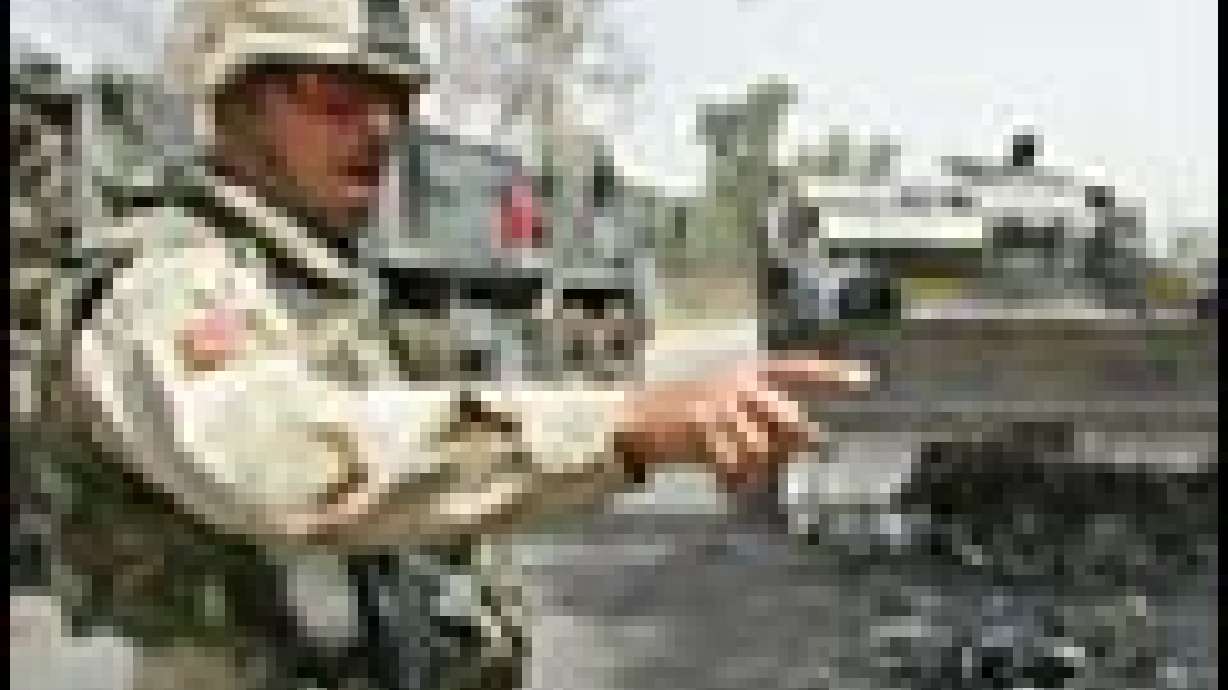Estimated read time: 4-5 minutes
This archived news story is available only for your personal, non-commercial use. Information in the story may be outdated or superseded by additional information. Reading or replaying the story in its archived form does not constitute a republication of the story.
BAGHDAD, Iraq (AP) -- A roadside bomb explosion Monday in the Iraqi capital killed one U.S. soldier and wounded two, bringing the American death toll to nearly 500 since the start of fighting in March.
Also Monday, in a full-page newspaper ad, Iraq's top Shiite Muslim cleric reiterated his demand for the country's next legislature to be elected as he hardens his opposition to U.S. plans for regional caucuses.
The 1st Armored Divison soldier killed was the first reported combat death among U.S. troops in Iraq since Friday, when nine soldiers were killed when a Black Hawk medevac helicopter was shot down near Fallujah.
U.S. officials say incessant attacks by anti-American insurgents have declined in frequency since the capture of Saddam Hussein, with an average of 17 attacks a day against U.S. troops in the past week compared to 30 a day before Saddam was seized Dec. 13.
Most of the total U.S. casualties in Iraq have occurred since President Bush declared an end to major combat May 1 -- and many of have been caused by insurgent ambushes and roadside bombs like the one Monday, which brought the American death toll to 496. Details including the soldier's identity were not immediately available.
Another roadside bomb exploded Monday near an Army convoy in Ramadi but the military said no U.S. casualties were reported. Local residents said two Iraqis were killed when the Americans opened fire after the attack.
Earlier Monday, the U.S. military said that U.S. soldiers uncovered a "large weapons cache" on Friday with the help of an Iraqi in Ramadi, a town west of Baghdad.
The Iraqi led the troops to a house, where they found dozens of rocket-propelled grenades and a handful of launchers, nearly 220 pounds of explosives, 16 remote controlled homemade bombs and two surface-to-air missiles, the military said in a statement.
Also acting on an Iraqi tip, U.S. soldiers shot dead seven members of an armed gang allegedly trying to steal oil from a pipeline south of Samarra, 60 miles north of Baghdad, the Army said Monday.
Troops led to the scene by an informant late Sunday found 40 men armed with AK-47 assault rifles in 10 to 15 vehicles at the pipeline, said a spokesman, Master Sgt. Robert Cargie.
Armed with M-16 rifles and 125mm cannons mounted on Bradley fighting vehicles, the U.S. troops shot and killed seven of the men in a gunfight. The remaining people escaped. Three fuel trucks and one transport truck were destroyed during the clash, Cargie added. No further details were available.
Iraq's fuel lines have been targeted regularly by anti-U.S. insurgents and others wanting to steal the vital reserves or sabotage the pipes.
The ad in the Iraqi newspaper, al-Zaman, quoted Grand Ayatollah Ali al-Husseini al-Sistani as telling a delegation of tribal leaders that power must rest with Iraqis and "not outsiders," an apparent reference to the U.S.-led occupation authorities
Al-Sistani, whose views are highly influential among Iraq's Shiite majority, said Sunday the current U.S. plan to have regional caucuses select members of a provisional national assembly would give birth to an illegitimate Iraqi government.
The ad appeared to have been placed by the tribal leaders.
Separately, the top U.S. administrator, L. Paul Bremer, said the United States is opposed to the maintenance of armed militias by Iraqi political parties and groups vying to fill the country's power vacuum will have to lay down arms in a future democracy.
"In a unified Iraq there is no place for political parties having armed groups," Bremer told reporters.
"We have never announced that the coalition was in favor of militia," he said when asked to comment on the status of a reported U.S. plan to create an anti-terrorism group with the several militias that had opposed the regime of Saddam Hussein.
Some of the militias are run by Kurdish parties in northern Iraq, which had been outside Saddam's control for more than a decade. Others are from the majority Shiite Muslim population.
"We believe it is important for those militias that exist to be phased out as Iraq moves toward sovereignty," Bremer said.
Under the U.S. plan, a transitional Iraqi assembly -- to be chosen by regional committees -- would select an interim government ahead of full elections in 2005.
But al-Sistani, who met Sunday with officials from the U.S.-appointed Iraqi Governing Council in the holy Shiite city of Najaf, said the U.S. plan would give birth to an illegitimate Iraqi government.
"This will, in turn, give rise to new problems and the political and security situation will deteriorate," al-Sistani said in a statement released by his office Sunday.
Al-Sistani is the spiritual leader of most of Iraq's majority Shiites and has the power to influence their thinking.
Al-Sistani also said only an elected legislature can ratify the presence of U.S.-led coalition troops beyond July 1, a designated date for the handover of sovereignty to Iraqis.
Drafting a new plan to accommodate al-Sistani's views would make Washington look like it is allowing its Iraq policies to be held hostage to the wishes of one man. It also would further anger Iraq's minority Sunnis, who had dominated politics in Iraq for decades and are bristling at the attention given now to the Shiites they traditionally oppressed.
(Copyright 2004 by The Associated Press. All Rights Reserved.)









